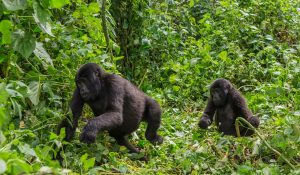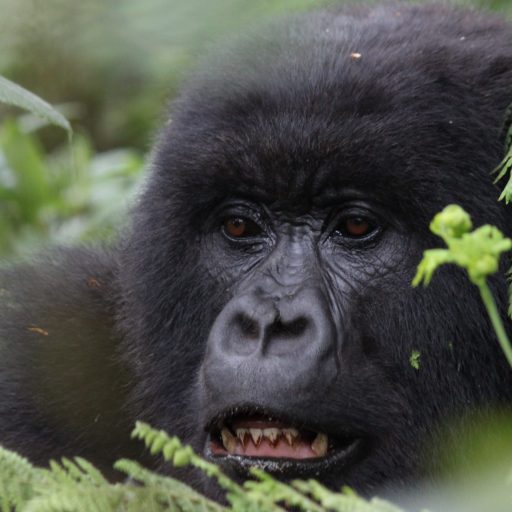How Many Gorilla Families Found In Rwanda
Rwanda’s Gorilla Families
Rwanda’s Volcanoes National Park serves as a sanctuary for a variety of habituated gorilla families, each with its own captivating tale woven into the fabric of the lush, dense forests. Within this natural haven, visitors are granted a rare privilege – the chance to witness these majestic creatures in their undisturbed habitat. Each gorilla family presents a unique narrative, from the playful dynamics of juvenile members to the dignified leadership of silverbacks. As travelers venture along the park’s winding trails, they immerse themselves in a world where every rustle of foliage and each echoing call carries the promise of a remarkable encounter. It’s within this harmonious coexistence between humans and gorillas that Rwanda’s commitment to conservation and sustainable tourism shines brightest, offering a profound connection to the wonders of the natural world while safeguarding the future of these endangered primates for generations to come
1. Susa Gorilla Family
Among the most well-known and largest gorilla families in Rwanda is the Susa group. With over 28 members, including several infants, the Susa family is a sight to behold. Led by a dominant silverback, this family roams the slopes of the Virunga Mountains, captivating visitors with their playful antics and familial bonds.
2. Amahoro Gorilla Family
Translated as “peace” in the local language, the Amahoro family lives up to its name with its serene demeanor. Comprising around 17 members, this peaceful family resides in the upper slopes of the volcanic range. Visitors often marvel at their tranquil interactions and the nurturing care provided by the dominant silverback.
3. Sabyinyo Gorilla Family
Named after the Sabyinyo Volcano, which forms part of their territory, the Sabyinyo family is one of the easiest groups to trek in Volcanoes National Park. With approximately 13 members, including several playful juveniles, encountering the Sabyinyo gorillas is a delight for many visitors.
4. Kwitonda Gorilla Family
The Kwitonda family, meaning “humble one,” migrated from the Democratic Republic of Congo to Rwanda’s Volcanoes National Park. Led by a gentle silverback, this family comprises around 18 members and is often found grazing peacefully in the bamboo forests.
5. Hirwa Gorilla Family
Formed by members from different existing families, the Hirwa group symbolizes resilience and unity. With around 16 members, this family offers a unique blend of behaviors inherited from their diverse backgrounds, making them a fascinating subject for researchers and visitors alike.
6. Ugenda Gorilla Family
Ugenda, meaning “mobile” in the local language, aptly describes the movement patterns of this gorilla family. With approximately 11 members, including a dominant silverback, Ugenda’s group often traverses vast areas within their territory, providing visitors with an adventurous trekking experience.
Conservation Efforts and Challenges
While Rwanda has made significant strides in gorilla conservation, challenges persist in ensuring the long-term survival of these magnificent creatures. Human encroachment, poaching, and habitat loss remain significant threats to gorilla populations, necessitating ongoing conservation efforts.
To address these challenges, Rwanda has implemented various conservation initiatives, including community-based ecotourism projects, anti-poaching patrols, and habitat restoration programs. Additionally, stringent regulations govern gorilla trekking activities to minimize disturbances to the animals and their habitats.
The Economic Impact of Gorilla Tourism
Gorilla tourism not only contributes to conservation efforts but also plays a vital role in Rwanda’s economy. Revenue generated from gorilla trekking permits helps fund conservation projects, support local communities, and promote sustainable development initiatives.
Moreover, gorilla tourism creates employment opportunities for local residents, ranging from park rangers and guides to hospitality staff and artisans. By fostering a culture of environmental stewardship and economic empowerment, gorilla tourism contributes to Rwanda’s overall socio-economic development.
Tips for Gorilla Trekking in Rwanda
- Book in Advance: Gorilla trekking permits are limited and often sell out months in advance. It’s advisable to book your permits well ahead of your planned visit to secure your spot.
- Be Prepared for Hiking: Gorilla trekking involves hiking through rugged terrain and dense forests. Ensure you’re physically fit and equipped with appropriate gear, including sturdy hiking boots, long pants, and a waterproof jacket.
- Respect Wildlife: While observing gorillas, maintain a respectful distance and follow the guidelines provided by your guides. Avoid making sudden movements or loud noises that could disturb the animals.
- Stay Hydrated and Energized: Carry sufficient water and snacks to stay hydrated and energized during your trek. The trekking experience can be physically demanding, so pace yourself accordingly.
- Capture Memories Responsibly: Photography is allowed during gorilla trekking, but ensure your camera’s flash is turned off to avoid startling the animals. Be mindful of your surroundings and focus on enjoying the moment rather than solely on capturing photos.
Rwanda’s gorilla families offer a captivating glimpse into the world of these remarkable primates. From the playful antics of juvenile gorillas to the serene demeanor of dominant silverbacks, observing these creatures in their natural habitat is a truly unforgettable experience. Through sustainable tourism and conservation efforts, Rwanda continues to safeguard its gorilla populations for future generations to cherish and admire. As visitors venture into the misty forests of Volcanoes National Park, they not only contribute to conservation but also embark on a journey of discovery and appreciation for Rwanda’s rich biodiversity.


















